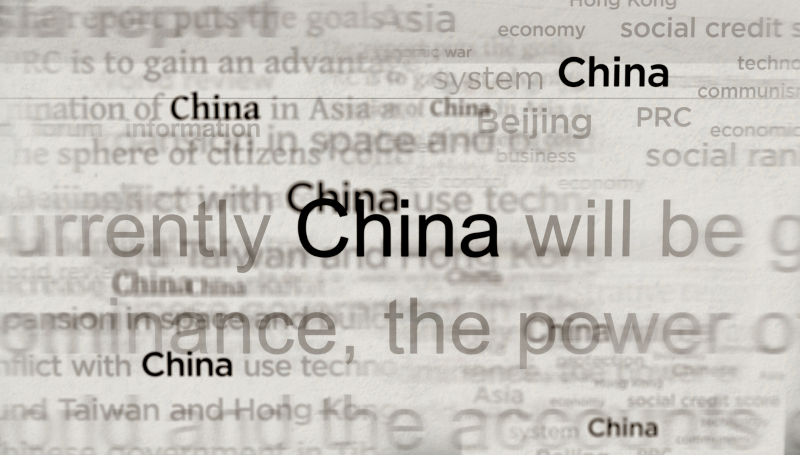News Corp’s China obsession: why beating the drum is easier than thinking
June 21, 2025
Introducing our new columnist Fred Zhang, who brings you his take on the way the Australian media reports and/or mis- and under- reports on China.
Last week, we saw yet another masterclass in how News Corp reduces complex geopolitical realities into blunt instruments of fear.
First, The Australian’s Greg Brown pressed Prime Minister Anthony Albanese at the National Press Club to declare China a national security threat – offering voters a binary where there should be nuance.
Then, on Sky News, Australian Strategic Policy Institute analyst Malcolm Davis warned that northern Australia’s infrastructure is “essentially undefended,” calling for an immediate and dramatic surge in defence spending – 3.5% of GDP within two years.
These are not isolated incidents.
They’re the latest instalments in a long-running campaign by News Corp’s ecosystem to frame China as an imminent military aggressor, and Australia as dangerously naïve if it doesn’t rush headlong into a new Cold War footing.
But here’s the problem: this narrative isn’t just alarmist. It’s dangerously reductive.
To many Australians, China is a complicated partner: the largest trading partner, a regional superpower, a competitor, and yes, at times, a strategic challenge. But to News Corp, it’s none of those things. It’s a bogeyman. A monolith. A threat.
In this worldview, any refusal to describe China as an immediate military danger is framed as weakness. Diplomacy becomes appeasement. Nuance becomes naivety. You’re either “realistic” (i.e. hawkish), or you’re selling the country out.
It’s why Greg Brown pushed Albanese so hard for a soundbite – not to extract insight, but to force a declaration. “Is China a military threat to Australia?” he asked, twice, clearly unsatisfied by the prime minister’s sober insistence on maturity and diplomacy. Because “PM calls for regional peace” doesn’t make for a dramatic headline. “PM refuses to call out China threat” does.
On Sky News, the message was blunter.
Davis, a senior ASPI analyst and a regular media commentator, warned that key military and energy infrastructure in northern Australia is “essentially undefended".
With alarming certainty, he predicted China would invade Taiwan within a decade, and that such a move would almost inevitably draw Australia into high-intensity warfare.
To Sky’s audience, this wasn’t analysis – it was prophecy.
The solution looks simple: triple defence spending, mobilise for a protracted war, prepare for the worst.
What’s left unsaid in all this is more important than what’s said.
Where is the public debate about opportunity cost? About the risk of escalation? About the fact that China has not once signalled direct military aggression toward Australia?
Where is the discussion about diplomacy, multilateralism, or economic interdependence as part of national resilience?
Missing – because none of those make for urgent, ticker-worthy TV.
This fear-driven framing reached peak absurdity when News Corp published a headline suggesting Chinese warships were “targeting our cities” during live-fire drills off Australia’s coast – despite the exercises taking place in international waters, far from any real threat.
Richard Marles, our Defence Minister, explicitly stated the government had closely monitored the task group and understood its intent.
Yet his refusal to publicly confirm operational details — standard practice to protect intelligence methods — was spun as ominous.
There was no evidence China was rehearsing strikes on Australian cities, but the mere act of posing the question allowed the article to imply otherwise.
It’s strategic ambiguity weaponised as clickbait. The real danger isn’t the flotilla – it’s how coverage like this deliberately inflames public fear, equates presence with aggression, and manipulates “no comment” into a warning signal.
Instead of informing Australians, this coverage distorts regional dynamics into a drumbeat for war.
The real concern here is how these narratives feed each other.
News Corp pushes the “China threat” line through multiple channels — Sky, The Australian, Herald Sun — and amplifies voices like ASPI’s, a think-tank partially funded by foreign defence contractors and aligned with Washington’s hawkish strategic thinking.
In turn, these narratives create political pressure.
Ministers are urged to “get serious,” to spend more, to speak tougher. If they don’t, they risk being labelled as soft – never mind that quiet diplomacy and strategic ambiguity are often more effective tools than megaphone militarism.
This echo chamber rewards fear, not thoughtfulness.
None of this is to suggest that Australia shouldn’t take its defence seriously.
We should. We live in an uncertain region, but security isn’t just about missiles and bases – it’s about making wise choices, resisting panic, and maintaining control over our own strategic narrative.
By casting diplomacy as cowardice and pushing war-readiness as patriotic common sense, News Corp is doing the public a disservice. It is narrowing the debate, silencing reasonable voices, and dragging Australia into a worldview that mistakes clarity for crudeness.
There’s a reason leader like Albanese and Marles avoid falling into this trap.
They know what’s at stake. Perhaps it’s time more journalists remembered that too.
The views expressed in this article may or may not reflect those of Pearls and Irritations.

